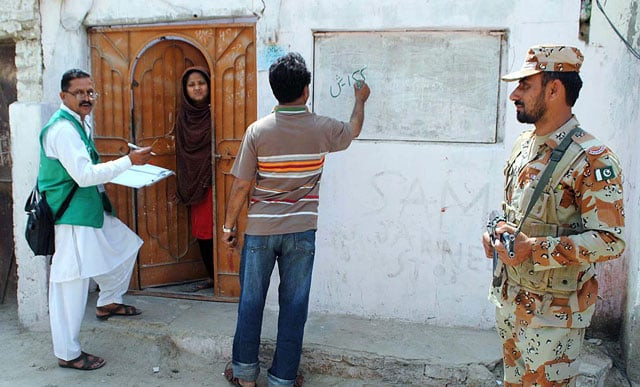Centre rejects 'flawed census' claims by Sindh
Statistics Minister Kamran Michael says census results were reconciled by civil, military personnel

Statistics Minister Kamran Michael says census results were reconciled by civil, military personnel. PHOTO: APP/FILE
The Federal Minister for Statistics Kamran Michael also announced that the federal government was ready to amend the Constitution to hold next general elections on the basis of provisional summary results of the sixth population census.
He made these announcements while addressing his first press conference after taking charge of newly constituted Ministry of Statistics. It was also first official response by the federal government to criticism against the provisional results of the sixth population census.
PPP rejects census, announces holding of APC
The Sindh-based political parties have rejected the population census results, claiming that 47.9 million population of the province was underreported by at least 10 million. The 47.9 million population is 17.2 million or 57 per cent higher than 19 years ago.
The statistics minister said that the next general elections, whether being held on time or delayed, have to be conducted on the basis of sixth population census results. In order to avoid any delay, the federal government has proposed in the Council of Common Interests meeting that there was a need to amend the Constitution to hold general elections on provisional results, he added.
Under the current constitutional scheme, the general elections can be held only on the basis of final results. The minister said that the final results will be available by April next year, which may delay the next general elections. The present Parliament will complete its term in June and the next general elections will have to be conducted within three months of the end of the term.
The minister said that all the provincial chief ministers present in the CCI meeting said that they would respond to the proposal of amending the Constitution after holding consultations with their respective political parties.
Census: counting the impact
We need political consensus for bringing amendment in the Constitution, he added.
While responding to Sindh’s objections, Michael said that the Sindh government had no reason to object on the population results when the door-to-door census was conducted by employees of provincial and local governments under the supervision of deputy and assistant commissioners.
The Pakistan Bureau of Statistics had hired services of 120,000 employees of the provincial and local governments. About 200,000 army personnel were also engaged in the largest ever door-to-door exercise and every team of civilian enumerators was accompanied by military personal aimed at ensuring transparency and credibility.
He said that the provisional results have been announced after reconciling the data collected by both civilian enumerators and the military personnel. To a question on holding a joint press conference with Director General ISPR, the minister said that the military was involved at every stage of planning and execution and was still part of this process.
He said that except Sindh no other province raised objections on the provisional results.
The CCI and National Assembly were the right forums for debating the results of the population census and no one should malign the state institutions by holding protest rallies, he underscored.
He said that no provincial government objected to the census results during the CCI meeting.
Census results: Just over 10,000, transgender people only 0.005% of Pakistan's population
The Ministry of Statistics had presented the provisional results in the meeting of Council of Common Interests last week. According to provisional results, Pakistan’s total population is now 207.774 million – higher by 57 per cent over the 1998 census results. Out of the total population, 52.95 per cent is living in Punjab – 2.7 per cent less than 19 years ago. About 23 per cent lives in Sindh – which is the same as of 19 years ago and cause of resentment among Sindh-based political parties.
About 5.94 per cent lives in Balochistan and is almost 1 per cent more than 19 years ago and 14.69 per cent lives in Khyber Pakhtunkhwa, which is 1.28 per cent higher than 19 years ago. The share of Fata population slightly increased 0.1 per cent to 2.41 per cent of the total population of the country.
The minister also said that Karachi city’s population of 14.91 million was reported, as per the demarcations of urban-rural areas by the Sindh government. He said that Mangopir and Karachi west districts still comprise of rural areas.
Unlike this, Punjab government declared 261 Mouzas of Lahore as part of city in January 2015.



















COMMENTS
Comments are moderated and generally will be posted if they are on-topic and not abusive.
For more information, please see our Comments FAQ